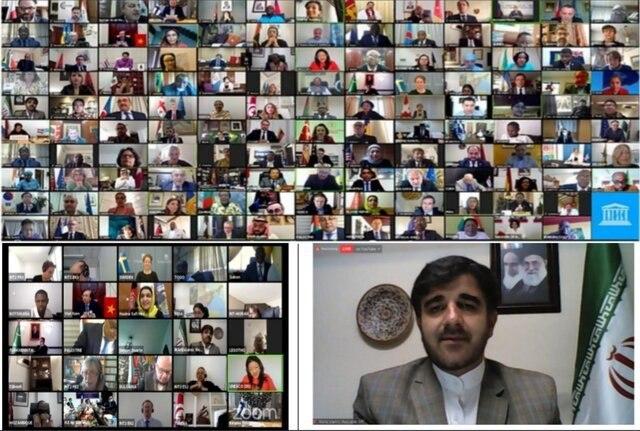Mohammad Reza Bahmani, Head of the Centre for Information Technology and Digital Media at Iran’s Ministry of Culture and Islamic Guidance, told a meeting of the culture ministry representatives of different countries that challenges caused by the coronavirus can be addressed via cultural activities.
He made the remarks at the first virtual meeting of the Ministers of Culture of UNESCO member states on the impact of COVID-19 on the culture and art of the world. The meeting was held in the presence of a group of ministers of culture of the world and their representatives.
Bahmani also explained the Islamic Republic’s cultural and artistic efforts to combat coronavirus.
Referring to the most important cultural challenges caused by the corona pandemic and the performance of the people and the government of Iran in this situation, he said this year, the Nowruz ceremony was not held and family and social relations were affected. Therefore, in order to reduce the negative effects of this issue, the audio and video communications were increased.
“Tehran International Book Fair, which is one of the busiest exhibitions in the world in terms of public attendance, was canceled due to the spread of the corona. However, publishers paid the delivery cost of books and offered discounts of up to 80 percent on digital books. They also implemented a plan to help people access the books online,” he said.
He noted during the New Year holidays, cinemas, concerts, theatres and bookstores are usually very busy in Iran, but they were closed this year. This situation has caused a lot of damage, and the government is trying to pay for part of it, but the US government’s economic sanctions on Iran, which is contrary to the UN regulations, have made such assistance very difficult. That’s why hundreds of Iranian artists have called for a campaign to protest the harsh US economic sanctions against the Iranian people.
The representative of the culture minister said pilgrimage to religious sites is one of the main interests of the Iranian people during the lunar months of Rajab, Sha’ban and Ramadan, but they avoided this activity with the spread of the corona. Instead, the faithful people of Iran have paid attention to individual veneration and spirituality at homes.
Although it is very dangerous to approach patients with corona, many groups of young students, clerics and the military personnel are in hospitals to help the healthcare staff, mentioned Bahmani.
“The production and dissemination of cultural and artistic content by writers, journalists and religious missionaries on social media platforms has increased fivefold during the days of the corona outbreak, and this has helped people to stay at home.”
Let’s work together to turn these threats into another opportunity, he urged. This can be achieved through the development of cultural and artistic exchanges, as well as the fostering of fundamental humanitarian values, he concluded.
In another part of this meeting, which was attended by more than 130 ministers and deputy ministers of culture, some other ministers presented their views and actions on the effects of coronavirus on their country’s culture and art.
